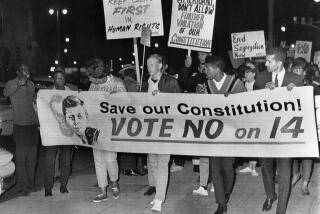HEALTH WATCH : Sleeping, Not Dead
- Share via
Health care reform didn’t occur this year, and that’s a real loss not only for President Clinton and Senate Majority Leader George J. Mitchell but also for the nation. However, politics is the art of the possible, and health reform will return--in another and probably more palatable form.
Americans who have been paying attention to news during the last year cannot help but be more informed about the key issues of health care reform--expanding access to care, containing costs and maintaining quality. The disagreement was not over the goals. It was over how to achieve the goals.
The various tugs of war proved too much for even Washington: special medical, labor and senior citizen interests; Republicans versus Democrats; a largely confused set of middle-class voters who didn’t want to lose benefits when they changed or lost a job but who also didn’t want to pay more for that security. And even those who were willing to pay more didn’t necessarily trust the government to change things for the better.
But it’s not hopeless. Sen. Harris Wofford of Pennsylvania has made what we think is an apt comparison between Washington’s struggle over health care and its long legislative struggle over civil rights. Congress in 1957 passed what amounted to a fairly toothless civil rights act, then passed another in 1960; those paved the way for the landmark Civil Rights Act of 1964. Health care reform may take a similar route. And if the result is as positive and life-changing for Americans as the 1964 act was, it will be a wait that’s worth it.
More to Read
Sign up for Essential California
The most important California stories and recommendations in your inbox every morning.
You may occasionally receive promotional content from the Los Angeles Times.













